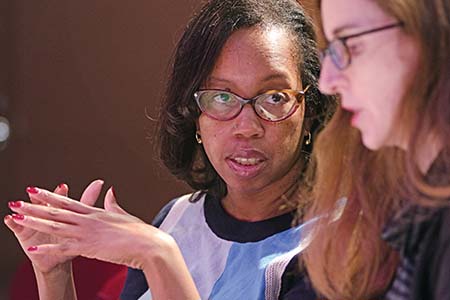
Nina Simone once said, “An artist’s duty, as far as I’m concerned, is to reflect the times.” It’s an ethos that playwright Christina Ham takes seriously—so much so that she wrote a much-produced play about the great singer/composer, Nina Simone: Four Women. The play takes its name from Simone’s song about four aspects or modes of blackness, and traces Simone’s politicization after the bombing of the 16th Street Baptist Church in Birmingham in 1963, which inspired the song “Mississippi Goddam.” Ham’s play portrays the lives of black women “caught in the crosshairs of history through no fault of their own.”
Ham, who is among the most-produced playwrights in the U.S. this season, explores similar thematic territory with her plays Four Little Girls: Birmingham 1963, about the young victims of that bombing, and Ruby!: The Story of Ruby Bridges, about the black girl who desegregated a Louisiana school in 1960. The struggle hasn’t just been for the rights of African Americans, Ham points out. “I found out that black women did not march beside the men in the March on Washington,” says Ham, now based in Los Angeles as a writer for Netflix’s “The Chilling Adventures of Sabrina.” “Black women and their needs were constantly being back-seated, even though they were an integral part of building the Civil Rights Movement.”
Though she was never a history buff growing up (in fact, history was her least favorite subject in school “besides math,” she confesses), Ham says she’s become obsessed with what she calls “footnotes in black history”: Her play Scapegoat takes place in 1919, and recounts the massacre of 200 black people in Arkansas; West of Central, which premiered at Minneapolis’s Pillsbury House Theatre in September, takes place during the Watts riots in 1966 Los Angeles; and The Watsons Go to Birmingham, a work for young audiences that will premiere at the Kennedy Center in March 2019, is set in 1963 in that pivotal Alabama town. Not that the Civil Rights Era is ancient history. “We’re still in it and I don’t understand why,” Ham admits. That’s why she’s “going back to where this started, to really understand where we are.”
Says Faye Price, co-artistic director of Pillsbury, where Ham is a playwright-in-residence, “For Christina, history doesn’t merely inform the present, it haunts the present, revealing legacies and silent covenants of long standing.” Adds Price, “Don’t let Christina’s quiet thoughtfulness and gentle presence fool you—her voice is wildly imaginative, with plays ranging from fantasy and speculative fiction to the apocalyptic.”
Price directed the world premiere of Nina Simone, which is playing this season at Kenny Leon’s True Colors Theatre Company, Seattle Rep, and Alabama Shakespeare Festival, among other theatres.
Ham is also dedicated to fostering the next generation of theatregoers and artists, so she writes as many works for young people as she does for adults, and also mentors and teaches. When asked what advice she would give to emerging playwrights, she says to focus on young people.
“Look toward theatre for young audiences as a place to start building your résumés for productions,” she says. “They’re constantly doing new work. They commission it, and unless it’s God-awful, they’re going to produce it.”
Ham, who once taught black theatre history in Augsburg College, says she tried to instill the values of analysis and questioning in her students, rather than teach them to regurgitate dates and places. She’s after a similar level of complexity and inquiry with her plays. Or, as Simone sang in “Four Women,” “Between two worlds/I do belong.”

